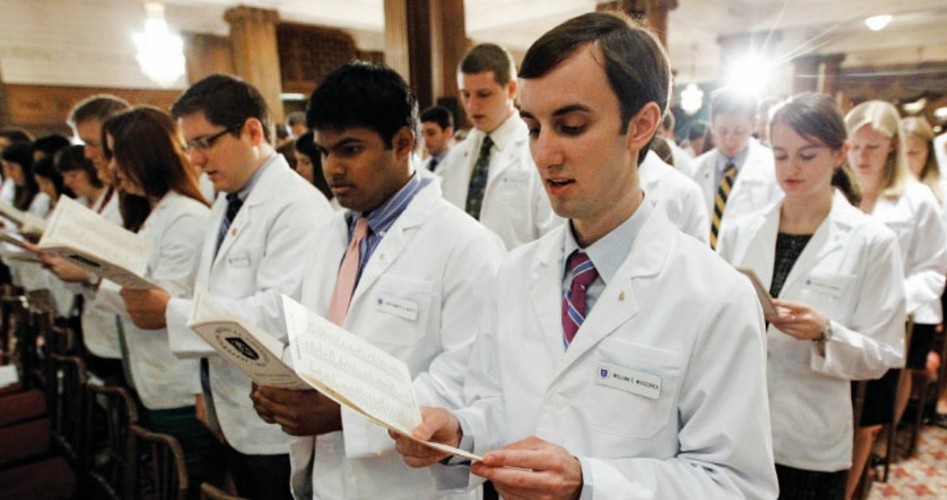Making Doctors Kill: The Tyranny of State-enforced Euthanasia
The Greek physician Hippocrates of Kos (c. 460-370 B.C.) is known today as the Father of Western medicine. His own writings and teachings — shrouded in the mists of history — can be synthesized in the subsequent research and practices of the Hippocratic School, which revolutionized and professionalized the study of medicine in ancient Greece, charting a course that doctors have followed for more than 2,000 years. In the Hippocratic Corpus — a collection of 70 or so medical works collected or collated in Alexandria in the 3rd century B.C. — can be found the Hippocratic Oath, a vow made to the gods to observe ethical standards in the pursuit and application of medical science. Modernized versions of the oath, stripped of religious sentiment, are still adhered to by medical practitioners across the globe. And though the phrase “first do no harm” does not always appear as such in modern versions of the oath, injunctions for doctors to “reject harm or mischief,” or to “not harm the patient” have always been part of the Hippocratic mandate. The first obligation of the physician is to cause no unnecessary damage or suffering. Yet some doctors now cause lethal damage to end suffering — viewing their actions as “mercy killing.”
“Euthanasia” is also a Greek word, meaning “good death.” In its ancient contexts, the word meant simply dying peacefully, as in its earliest recorded use, in Suetonius’ biography of Augustus, where the emperor died serenely, achieving the “euthanasia” he desired. In the 17th century, Francis Bacon became the first philosopher to use the term in a medical context, suggesting the responsibility of physicians to relieve physical suffering as much as possible during the process of death. Today “euthanasia” has come to take on many meanings and associations, from the cultural and theological to the philosophical and juridical. Legislatively and politically, especially across the Western world, the word has come to mean the deliberate cessation of a human life by a physician at the request of his or her patient. For the past decade, euthanasia has been among the most researched topics in modern bioethics, with most studies calling for greater freedom for patients to request and doctors to practice euthanasia. Ominously, the debate over euthanasia is increasingly divorced from moral considerations and coopted by legislatures and governmental committees, paving the way for a new type of tyranny that strips away the rights of individual conscience in the pursuit of death on demand. Doctors, pharmacists, and institutions are now increasingly being forced against their will to help kill people. The results of this legislative overreach carry staggering consequences for liberty, individualism, and self-determination.
Oh, Canada! How the Right to Die Became a Mandate to Kill
In Canada prior to 2015, active euthanasia (intentionally killing a person to ease pain and suffering) was illegal, while passive euthanasia (removing or withholding life-sustaining support or nourishment) was both legal and common. In March 2014, Winnipeg Tory MP Steven Fletcher introduced two influential pieces of legislation. The first allows doctors to help patients end their lives in restricted circumstances. For instance, the individual must be of “sound mind,” and possessing “an illness, disability, or disease that causes physical or psychological suffering that is intolerable to that person and that cannot be alleviated by any medical treatment acceptable to that person.” The other bill, predictably, calls for the creation of a “commission” to monitor the system. Most remarkable is the first measure, which includes the possibility of doctor-assisted suicide for non-life threatening psychological disorders that are deemed unbearable by the individual. Equally eye-popping is the suggestion that doctor-assisted suicide is feasible for patients who reject medical treatments that they deem not “acceptable.”
JBS Member or ShopJBS.org Customer?
Sign in with your ShopJBS.org account username and password or use that login to subscribe.

 Subscribe Now
Subscribe Now
- 24 Issues Per Year
- Digital Edition Access
- Exclusive Subscriber Content
- Audio provided for all articles
- Unlimited access to past issues
- Cancel anytime.
- Renews automatically

 Subscribe Now
Subscribe Now
- 24 Issues Per Year
- Print edition delivery (USA)
*Available Outside USA - Digital Edition Access
- Exclusive Subscriber Content
- Audio provided for all articles
- Unlimited access to past issues
- Cancel anytime.
- Renews automatically


